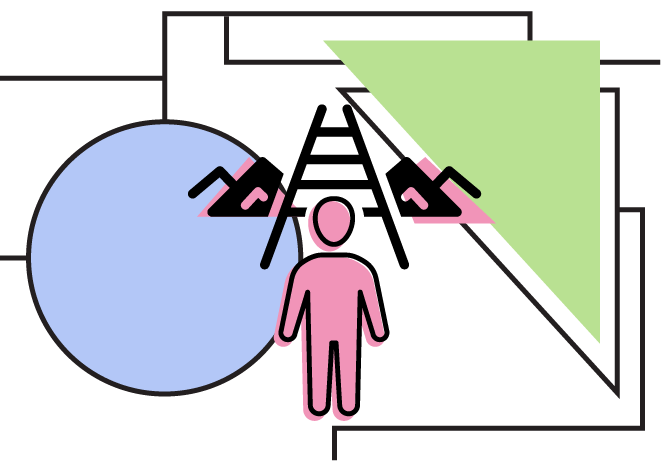What should be done for those who cannot go to church because of impairments? Those who cannot leave their homes or health care residences miss the fellowship, community worship, and body life that comes with attending church. But critically, they miss others helping them grow spiritually. They need spiritual care. We must take the church—the body of Christ with all its spiritual engagement and blessings—to people with disabilities who cannot come to church. What could this look like?
We must take the church—the body of Christ with all its spiritual engagement and blessings—to people with disabilities who cannot come to church.
Although many people with disabilities[1] actively participate in their local churches, others cannot. But disability vocational care workers—disability health care, inclusive education, and disability services professionals—can take the church to people with disabling conditions. Through personal contact in their work, they can be the church mobilized to serve people with disabling conditions by administering spiritual care. After all, they are called and gifted Christ-followers who want to serve him through their work.[2]

Disability and Vocation
Jesus said, ‘I was sick and you looked after me, I was in prison and you came to visit me’ (Matt 25:36). Our Savior speaks about people who could not go to the gathered assembly of a synagogue or a church. Jesus makes the point that if you go to people who are ill or in prison, and minister to them with your presence and spiritual nurture, you do so for him. That is because the primary goal of mission is spiritual maturity.[3]
Paul worships and evangelizes in prison (Acts 16:25-34). These engagements are not just social activities; they intend spiritual impact. They do not just cheer people up but minister comfort, peace, and encouragement in time of great need. When Scripture talks about encouragement it usually means spiritual guidance, not just a pep talk. It is being present and speaking truth.[4] Spiritual care administered through vocational care is mission.
Many believers who work one-on-one with people with disabilities chose their vocation as a calling.
Many believers who work one-on-one with people with disabilities chose their vocation as a calling.[5] Health care workers, child development and education specialists, and disability service professionals focus their attention on administering physical and mental care. The close relationships afforded them through personal engagement provide opportunities to administer spiritual care, even spiritual formation.[6]
Not only do many disability professionals believe God led them to their work, their faith and spiritual values motivate them daily to serve faithfully in those roles. God gives them success in their labors every day at work.[7] How many serve people with disabilities globally? United, they are a workforce spanning the globe. But not only are they millions-strong, they also are highly committed. After all it is their mission.
Christian disability care professionals comfort, encourage, and counsel people with disabling conditions on spiritual life issues while administering care. For example, nurses, therapists, and doctors can pray with patients before surgery; educators can advise students and their parents to draw upon the best spiritual motives to work hard in academic programs; and disability service professionals can encourage those they serve not to neglect spiritual interests as they help people with disabling conditions design their lives through person-centered planning.
In a conversation between a caregiver and one cared for, sharing just one Bible verse can change the way that a person with a disability feels about challenges they face. For example, hearing for the first time or just being reminded that they are ‘fearfully and wonderfully made’ (Ps 139:14) can bring great comfort and encouragement. Knowing that God is not punishing them by letting them experience disability is soul-healing. Spiritual counselling is specifically important for those suffering from isolation or discouragement with lack of progress in rehabilitation and chronic pain. Such conditions are often more damaging than the physical challenges and pain associated with disability.

Vocational Disability Care as Mission
From the church’s inception, Christians have applied their calling and giftedness, their vocation, to meet spiritual needs while caring for others. The church has played a critical role in starting hospitals, schools, and disability services as part of its mission.[8] Not surprisingly, these agencies have often been staffed by church members who saw their role as ministering spiritual care as well as physical help.
Today in many places these institutions are commonly funded by tax dollars and administered by government agencies. But there is still space provided for spiritual care as mission. History and current expedience call us back to a blend of care. It is hard to imagine a greater and more consistent source of spiritual nurture and disability care than unleashing the workforce of Christian disability professionals. But it gets better.
Christians have applied their calling and giftedness, their vocation, to meet spiritual needs while caring for others.
First, vocational workers enjoy direct and ongoing contact with people with impairments. Pastors and other local church workers may not be able to spend sustained periods of time getting to know people with disabilities and their families. Consequently, church leaders do not easily find opportunities to speak truth and comfort into their lives due to lack of proximity, although many try. Some succeed.
But second, our institutional buildings are embedded in the community. Hospitals, schools, and disability service centers are not only near where people with disabilities reside, they also are designed and regulated to focus on accommodating people with disabling conditions. One could argue that churches should be as well. Many are. But churches may not be accessible to people with disabilities, for accessibility is more than ramps and widened doorways. It includes when services are offered, how they are conducted, and basically how easily a person with an impairment can participate, if at all. That is another reason those serving in disability vocations have significant advantages in mission. Also, they are often fully funded by government agencies.
Disability vocation complements those doing traditional missions. Local churches send out health care workers, child development specialists, and disability service workers to other countries to take part in traditional mission as they have for centuries. The work continues.
But like traditional mission, we must encourage vocational disability professionals to play an even greater role in spiritual care at home and in our own neighborhoods as outreach of our churches. People with disabilities whom they serve through care can grow spiritually while they receive encouragement to find their own giftedness and calling. What joy they experience when they discover that they may be differently abled but they too can participate fully as members in the body of Christ! These efforts will ensure in them a sense of belonging and reduce their isolation.
The groundwork for vocational disability mission has been laid. Many disability professionals who are called, gifted, trained, and placed are active in the lives of persons with disabilities. But they need pastors and other church leaders to encourage, inspire, and resource this large and impactful global task force. They will seize spiritual care opportunities that we sometimes call ‘mission moments’ during their daily engagement with people with disabling conditions. This will take very little effort or expense while the outcome could be significant.
But first, the church must acknowledge and support their role as mission. This is a workplace ministry that offers extraordinary opportunities for spiritual care, opportunities that may not come any other way. We must take the church to people with disabilities.

The Called-to-Care Vocational Initiative
For the last ten years, the Lausanne Disability Concerns Network has focused primarily on developing leaders with disabilities for all local church ministries and Christian organizational leadership roles.[9] Called and gifted people with disabling conditions can serve as leaders often surpassing expectations. They can even participate in international mission.
Moving forward, our network will continue with its disability leadership focus, particularly disability in mission.[10] But, following Lausanne’s commitment to bring ‘kingdom impact to every sphere of society,’ as well as its workforce ministry initiative, the Lausanne’s Disability Concerns Network will add disability vocation as mission to our network plan. Like all Christian workers, people called to serve in disability vocational roles need encouragement, freedom to pursue mission innovation appropriate to their sphere of work, and resources to do their work effectively among other forms of support.
Our goal is to connect with them to implement our disability vocation as mission initiative and to support them in their plans.
Therefore, our network has added three new catalyst roles in disability healthcare, child development, and services to our disability ministry focus. We plan to partner with other Lausanne issue networks, regional groups, generational groups, and the newly created Nehemiah Teams.[11] Our goal is to connect with them to implement our disability vocation as mission initiative and to support them in their plans.
We hope to recover the lost ground of spiritual impact as the church has relinquished its work of care to government agencies, for which we are very grateful. With deep respect for the work of non-Christian colleagues in care, we wish to add spiritual care. We invite local churches globally to include people with disabilities, remembering those who cannot gather in local churches.[12]
As one response, we encourage young people in training to consider disability care roles as opportunities to serve God in their care for others. We need many more of them, for the number of people with disabling conditions is increasing exponentially daily. For example, there is roughly a 50 percent chance for those aged 80 or older to develop some form of disability, making it difficult or impossible to participate in church. Young Christians, is God calling you to serve this group with physical and spiritual care?
Vocation is a platform for high-impact mission to people with disabling conditions. It is hard to imagine a greater opportunity for mission, one that is only partially being realized.[13] What is more, many people with disabilities can serve in vocations where their lived experience with disability can bring empathy, support, and spiritual care.[14]
What prevents the global church from engaging people with disabilities as spiritual care along with professional care? Disability vocational mission is biblically sound and sustainably effective. All that remains is to encourage, resource, and support disability vocational care workers through prayer, awareness, and inspiration.
The global workforce is heavily populated with disability service professionals of all sorts. Those who follow Christ have a unique venue for service. May the mission continue and increase so that people with disabilities who cannot attend church can still experience the church’s spiritual life, resources, and blessings as disability vocational care workers take the church to them.
Endnotes
- Following standard journalistic conventions, this study will use people first language when referring to people with disabilities as well as variations such as people with impairments or people with disabling conditions.
- Consistent with John Stott’s definition of work as vocation: ‘Work is the expenditure of energy (manual or mental or both) in the service of others, which brings fulfillment to the worker, benefit to the community, and glory to God’, John R. W. Stott, Issues Facing Christians Today (Grand Rapids, MI: Zondervan, 2014) 225.
- David G. Peterson, ‘Maturity: the goal of mission’ in The Gospel to the Nations: Perspectives on Paul’s Mission, eds. Peter Bolt and Mark Thompson (Downers Grove, IL: IVP, 2000), 185-204.
- David G. Peterson, ‘The Ministry of Encouragement’ in God Who Is Rich in Mercy: Essays Presented to D.B Knox eds. P.T. O’Brien and David G. Peterson (Grand Rapids, MI: Baker Books, 1986), 249-50.
- For more on Christian vocation, see Gene Edward Veith Jr., God at Work: Your Christian Vocation in All of Life (Wheaton, IL: Crossway, 2002), 157.
- Larry Peabody, God Loves Your Work: Discover Why He Sends You to Do What You Do (Eugene, OR: Wipf and Stock, 2022), 116.
- On the true meaning of success in ministry, see Nathan Grills, ‘Success: Whose Will Is Being Done?’ in Faithful is Successful: Notes to the Driven Pilgrim, eds. Nathan Grills, David E. Lewis, and S. Joshua Swamidass (Denver. CO: Outskirts Press, 2014), 143-65.
- On the shift from individual service as opposed to institutionalized care or vice-versa, see Gregg E. Gardner, The Origins of Organized Charity in Rabbinic Judaism (Cambridge, UK; Cambridge University Press, 2015), 63-83; Edmund H. Oliver, The Social Achievements of the Christian Church (Vancouver, B.C.: Regent College Publishing, 2004, first published in 1930), 19.
- Dave Deuel, ‘Developing Young Leaders with Disabilities: A Ministry Beyond Our Wildest Dreams?’ in January 2016 issue of Lausanne Global Analysis, https://lausanne.org/content/lga/2016-01/developing-young-leaders-disabilities.
- For a fuller explanation of this initiative, see David C. Deuel and Nathan G. John eds., Disability in Mission: The Church’s Hidden Treasure (Peabody, MA; Lausanne- Hendrickson, 2019).
- For more information on the Lausanne leadership groupings, see https://lausanne.org/connections.
- For an exploration of the breadth of inclusive ministry see Leow Wen Pin, ‘A Theological Introduction to Disability,’ in Enabling Hearts: A Primer for Disability-Inclusive Churches, ed. Leow Wen Pin (Center for Disability Ministry in Asia: 2021), 7-11.
- Of John Stott’s desire, Alister Chapman says, ‘As he neared the end of his own life, his ambitions focused more and more on others, on making them more useful in the kingdom of God.’ Alister Chapman, Godly Ambition: John Stott and the Evangelical Movement (Oxford: Oxford University Press, 2012), 151.
- The Christian Institute on Disability at Joni and Friends has designed a spiritual care course for vocational workers, the premise of which is that personal spiritual growth invariably leads to spiritual care in others. See https://www.joniandfriends.org/.

